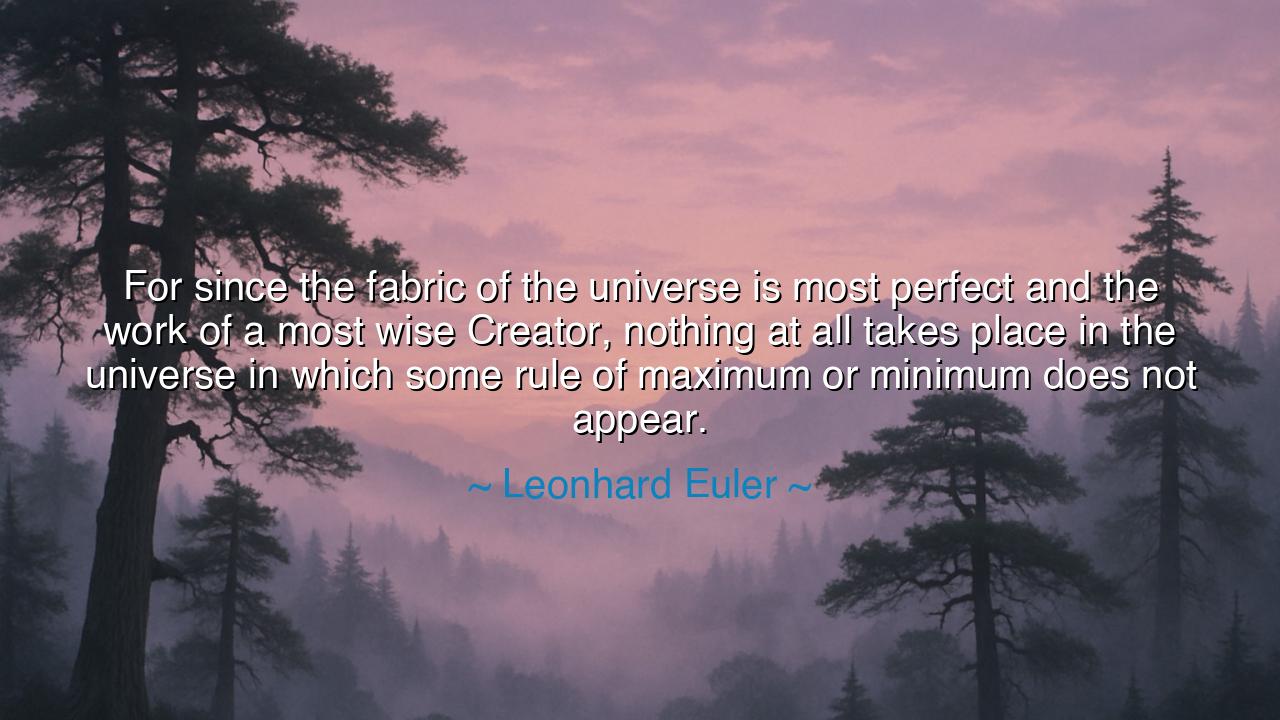
For since the fabric of the universe is most perfect and the
For since the fabric of the universe is most perfect and the work of a most wise Creator, nothing at all takes place in the universe in which some rule of maximum or minimum does not appear.






Hear the exalted voice of Leonhard Euler, master of numbers and seeker of divine order, who proclaimed: “For since the fabric of the universe is most perfect and the work of a most wise Creator, nothing at all takes place in the universe in which some rule of maximum or minimum does not appear.” In this utterance shines the harmony between faith and reason, where the language of mathematics becomes a hymn to the perfection of the Creator.
He gazed upon the fabric of the universe, not as chaos, but as design—woven with threads of symmetry, balance, and law. Just as the stars trace their courses with precision, and the rivers carve their beds with purpose, so too did Euler see that the hand of wisdom rules over all. In every movement of matter, in every breath of life, there is the hidden law of the maximum and the minimum, shaping reality with elegance.
This teaching reveals that the universe itself is a grand equation, where nothing is wasted and nothing is excessive. The path of light, the arc of the planets, the growth of living forms—all follow the secret principle that seeks the greatest economy, the least resistance, the most perfect balance. In these patterns, Euler discerned not chance, but the signature of a wise Creator.
Thus, let us learn: the world is not disorder but order, not accident but artistry. To study its laws is to draw nearer to its Maker, for in every maximum and every minimum, in every harmony of proportion, the eternal wisdom whispers. Euler’s words are not only for mathematicians, but for all who would see the divine woven into the very fabric of existence.






TTMinz's Than's Thien's
Euler’s statement invites us to reflect on the mathematical structure of the universe, suggesting that no event or phenomenon occurs without a specific balance. But how does this concept relate to human decision-making, where emotions and unpredictability often lead us astray from these ideal ‘extremes’? Does the universe truly follow these patterns in a way that we can understand, or are we simply trying to impose mathematical laws on a world that’s far more complex than we realize?
6H6.My Hanhh
The notion that everything in the universe is governed by a rule of maximum or minimum sparks an intriguing thought: Is this a reflection of how the universe was designed, or is it simply the way we interpret natural phenomena? Euler seems to be suggesting that perfection is built into the fabric of everything, but is it possible that the universe’s complexity sometimes defies neat categorization into rules of extremes? Or is that just a limitation of human understanding?
NLTrinh Nu Le
Euler’s perspective gives a sense of order and design to the universe. The idea that everything has its place and follows specific rules of optimization is comforting. But I wonder, do we always recognize these ‘rules’ in daily life? For example, how often do we notice moments of perfect balance or efficiency in our own experiences? Or is it only through science and mathematics that we can truly see the perfection Euler describes?
HHHo Huy
I find this quote fascinating because it suggests that everything in the universe follows a set of rules, specifically ones based on extremes—maximums and minimums. This idea reminds me of the concept of equilibrium in nature and science, where forces always balance out. But is it possible that we overlook some elements that don’t seem to fit these patterns? Could there be exceptions to this universal order, or is Euler’s view truly all-encompassing?
QTLe Nguyen Quynh Trang
Euler’s quote highlights the idea that the universe operates with an underlying perfection, governed by principles of balance. It’s almost poetic to think that everything, no matter how small, adheres to some mathematical rule of maximum or minimum. But does this idea of ‘perfection’ extend to human life as well? Can we apply these mathematical principles to our personal struggles or relationships, or is there something inherently different about human experience compared to the cosmos?